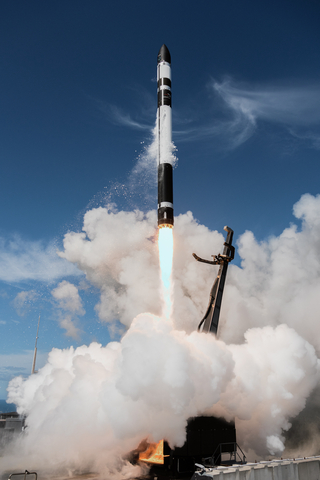Rocket Lab Successfully Launches 53rd Electron Mission, Deploys Another Five Satellites for Kinéis
Rocket Lab USA, Inc. (Nasdaq: RKLB) successfully launched its 53rd Electron mission, deploying five satellites to Low Earth Orbit for French Internet-of-Things (IoT) company Kinéis. The 'Kinéis Killed the RadIOT Star' mission lifted off from Rocket Lab Launch Complex 1 in Mahia, New Zealand, on 21 September 2023 at 11:01 a.m. NZST. This marks the second of five dedicated Electron launches for Kinéis, aimed at improving global IoT connectivity.
The Kinéis constellation will enable data transmission from remote locations, supporting applications such as forest fire detection, water resource management, and logistics tracking. Rocket Lab has now deployed 197 satellites across 53 launches for various customers and missions, including NASA, the National Reconnaissance Office, and commercial constellations.
Rocket Lab USA, Inc. (Nasdaq: RKLB) ha lanciato con successo la sua 53ª missione Electron, posizionando cinque satelliti in orbita terrestre bassa per la società francese di Internet delle cose (IoT) Kinéis. La missione 'Kinéis Killed the RadIOT Star' è decollata dal Rocket Lab Launch Complex 1 a Mahia, Nuova Zelanda, il 21 settembre 2023 alle 11:01 ora locale (NZST). Questo rappresenta il secondo dei cinque lanci dedicati di Electron per Kinéis, con l'obiettivo di migliorare la connettività globale IoT.
La costellazione Kinéis consentirà la trasmissione di dati da località remote, supportando applicazioni come la rilevazione di incendi boschivi, la gestione delle risorse idriche e il tracciamento della logistica. Rocket Lab ha ora lanciato 197 satelliti in 53 missioni per vari clienti e scopi, tra cui NASA, il National Reconnaissance Office e costellazioni commerciali.
Rocket Lab USA, Inc. (Nasdaq: RKLB) lanzó con éxito su 53ª misión Electron, desplegando cinco satélites en órbita terrestre baja para la empresa francesa de Internet de las Cosas (IoT) Kinéis. La misión 'Kinéis Killed the RadIOT Star' despegó del Rocket Lab Launch Complex 1 en Mahia, Nueva Zelanda, el 21 de septiembre de 2023 a las 11:01 a.m. NZST. Esto marca el segundo de cinco lanzamientos dedicados de Electron para Kinéis, con el objetivo de mejorar la conectividad global de IoT.
La constelación de Kinéis permitirá la transmisión de datos desde ubicaciones remotas, apoyando aplicaciones como la detección de incendios forestales, la gestión de recursos hídricos y el seguimiento logístico. Rocket Lab ha desplegado ya 197 satélites en 53 lanzamientos para varios clientes y misiones, incluyendo NASA, la Oficina Nacional de Reconocimiento y constelaciones comerciales.
로켓랩 USA 주식회사(Nasdaq: RKLB)가 성공적으로 53번째 일렉트론 미션을 발사하여 프랑스의 사물인터넷(IoT) 회사 키네이즈를 위해 다섯 개의 위성을 저지구 궤도로 배치했습니다. '키네이즈 킬드 더 라디오트 스타' 미션은 2023년 9월 21일 오전 11시 1분(NZST)에 뉴질랜드 마히아에 있는 로켓랩 발사 복합체 1에서 이륙했습니다. 이는 키네이즈를 위한 다섯 차례의 전용 일렉트론 발사 중 두 번째입니다. 이 미션의 목표는 전 세계 IoT 연결성을 향상시키는 것입니다.
키네이즈의 개념은 원거리에서 데이터를 전송할 수 있게 하여, 산불 감지, 수자원 관리 및 물류 추적과 같은 응용 프로그램을 지원합니다. 로켓랩은 현재 NASA, 국가 정찰국 및 상업 우주 네트워크를 포함한 다양한 고객과 임무를 위해 총 197개의 위성을 53차례 발사했습니다.
Rocket Lab USA, Inc. (Nasdaq: RKLB) a lancé avec succès sa 53ème mission Electron, déployant cinq satellites en orbite basse terrestre pour l'entreprise française Internet des objets (IoT) Kinéis. La mission 'Kinéis Killed the RadIOT Star' a décollé du Rocket Lab Launch Complex 1 à Mahia, Nouvelle-Zélande, le 21 septembre 2023 à 11h01 NZST. Cela marque la deuxième des cinq lancements dédiés d'Electron pour Kinéis, visant à améliorer la connectivité IoT mondiale.
La constellation Kinéis permettra la transmission de données depuis des endroits isolés, soutenant des applications telles que la détection des incendies de forêt, la gestion des ressources en eau et le suivi logistique. Rocket Lab a désormais déployé 197 satellites à travers 53 lancements pour divers clients et missions, y compris la NASA, le National Reconnaissance Office et des constellations commerciales.
Rocket Lab USA, Inc. (Nasdaq: RKLB) hat erfolgreich seine 53. Electron-Mission gestartet, bei der fünf Satelliten für das französische Internet-of-Things (IoT) Unternehmen Kinéis in eine niedrige Erdumlaufbahn gebracht wurden. Die Mission 'Kinéis Killed the RadIOT Star' hob am 21. September 2023 um 11:01 Uhr NZST vom Rocket Lab Launch Complex 1 in Mahia, Neuseeland, ab. Dies markiert den zweiten von fünf speziellen Electron-Starts für Kinéis, mit dem Ziel, die globale IoT-Konnektivität zu verbessern.
Die Kinéis-Konstellation wird die Datenübertragung aus entlegenen Gebieten ermöglichen und Anwendungen wie die Erkennung von Waldbränden, das Wassermanagement und die Logistikverfolgung unterstützen. Rocket Lab hat nun insgesamt 197 Satelliten aus 53 Starts für verschiedene Kunden und Missionen, darunter NASA, das National Reconnaissance Office und kommerzielle Konstellationen, eingesetzt.
- Successfully launched 53rd Electron mission, demonstrating consistent operational capability
- Deployed five satellites for Kinéis, furthering a multi-launch contract
- Expanded total satellite deployment count to 197, showcasing growing market presence
- Continued diversification of customer base, including government and commercial clients
- None.
Insights
The successful launch of Rocket Lab's 53rd Electron mission demonstrates the company's consistent operational capabilities in the small satellite launch market. With 197 satellites deployed to date, Rocket Lab is solidifying its position as a reliable and frequent launch provider. The deployment of five more Kinéis satellites highlights the growing demand for IoT connectivity in remote areas, potentially opening new revenue streams for Rocket Lab in the IoT sector.
From an engineering perspective, the ability to maintain a high launch cadence while serving diverse customer needs, from commercial IoT to national security missions, showcases Rocket Lab's versatile launch capabilities. This versatility could be a key differentiator in the competitive small satellite launch market, potentially leading to increased market share and revenue growth for the company.
Kinéis' ongoing satellite deployment signals a significant expansion in global IoT infrastructure. This constellation aims to address critical gaps in connectivity, particularly in remote areas, which could unlock new markets and applications for IoT technologies. The ability to connect and locate objects globally with low energy consumption addresses a important need in sectors like environmental monitoring, logistics and infrastructure management.
For investors, this development suggests potential growth in the IoT services market, with Kinéis positioned as a key player. The backing from the French government and established space-based solution providers adds credibility to the project. As Rocket Lab continues to support this deployment, it may benefit from the expanding IoT ecosystem, potentially securing more launches in this sector and diversifying its customer base.
Rocket Lab's consistent execution of launches, now at 53 missions, demonstrates a stable revenue stream from its launch services. The multi-launch contract with Kinéis, of which this is the second of five missions, indicates secured future revenue. This predictability in cash flow is favorable for investors, potentially reducing financial risks associated with the volatile space industry.
The company's expansion into satellite manufacturing and on-orbit management solutions represents a vertical integration strategy that could lead to higher profit margins and recurring revenue streams. However, investors should note that while operational metrics are strong, financial performance indicators such as profitability and cash flow are not provided in this news release. It's important to analyze Rocket Lab's full financial reports to assess its path to profitability and long-term financial sustainability in the competitive space market.
MAHIA,

Rocket Lab's Electron takes to the skies for its 53rd launch out of Mahia, NZ, for return French Internet-of-Things customer, Kinéis. Photo Credit: Rocket Lab
The ‘Kinéis Killed the RadIOT Star’ lifted off from Rocket Lab Launch Complex 1 in Mahia,
Rocket Lab founder and CEO Sir Peter Beck said: “Today’s successful launch marks another milestone for Rocket Lab as we continue to enable innovative companies like Kinéis to push the boundaries of global IoT connectivity. With each mission, we are bringing the world closer together, allowing vital data to be transmitted from the remotest corners of the Earth."
Across 53 launches Rocket Lab has now deployed 197 satellites for a diverse range of customers and missions, including NASA missions to the Moon, the National Reconnaissance Office and Space Force missions supporting national security and defense, scientific research to combat climate change, and commercial constellations providing vital data and services to millions of people on Earth.
Launch images: https://flic.kr/s/aHBqjBHZLj
Launch webcast: https://www.youtube.com/live/beVTGh_PrA0
+ About Rocket Lab
Founded in 2006, Rocket Lab is an end-to-end space company with an established track record of mission success. We deliver reliable launch services, satellite manufacture, spacecraft components, and on-orbit management solutions that make it faster, easier, and more affordable to access space. Headquartered in
+ Forward-Looking Statements
This press release contains forward-looking statements within the meaning of the Private Securities Litigation Reform Act of 1995. We intend such forward-looking statements to be covered by the safe harbor provisions for forward-looking statements contained in Section 27A of the Securities Act of 1933, as amended (the “Securities Act”) and Section 21E of the Securities Exchange Act of 1934, as amended (the “Exchange Act”). All statements contained in this press release other than statements of historical fact, including, without limitation, statements regarding our launch and space systems operations, launch schedule and window, safe and repeatable access to space, Neutron development, operational expansion and business strategy are forward-looking statements. The words “believe,” “may,” “will,” “estimate,” “potential,” “continue,” “anticipate,” “intend,” “expect,” “strategy,” “future,” “could,” “would,” “project,” “plan,” “target,” and similar expressions are intended to identify forward-looking statements, though not all forward-looking statements use these words or expressions. These statements are neither promises nor guarantees, but involve known and unknown risks, uncertainties and other important factors that may cause our actual results, performance or achievements to be materially different from any future results, performance or achievements expressed or implied by the forward-looking statements, including but not limited to the factors, risks and uncertainties included in our Annual Report on Form 10-K for the fiscal year ended December 31, 2023, as such factors may be updated from time to time in our other filings with the Securities and Exchange Commission (the “SEC”), accessible on the SEC’s website at www.sec.gov and the Investor Relations section of our website at www.rocketlabusa.com, which could cause our actual results to differ materially from those indicated by the forward-looking statements made in this press release. Any such forward-looking statements represent management’s estimates as of the date of this press release. While we may elect to update such forward-looking statements at some point in the future, we disclaim any obligation to do so, even if subsequent events cause our views to change.
View source version on businesswire.com: https://www.businesswire.com/news/home/20240920263262/en/
+ Rocket Lab Media Contact
Lindsay McLaurin
media@rocketlabusa.com
Source: Rocket Lab USA, Inc.






